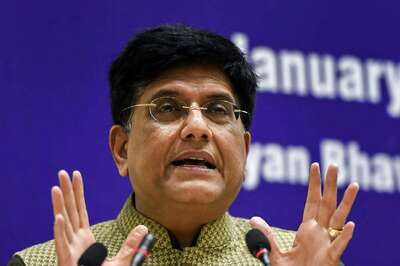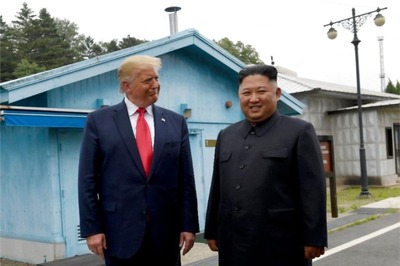
views
India has for three weeks been under an unprecedented lockdown and it has now extended by another 20 days. The near total stoppage of economic activity has hurt every section of society, but the hardest hit have been the migrants, the daily wagers, small businesses and the poor. As the government prepares to unveil a revival package to mitigate economic hardships, it would be wise to prioritise those at the very bottom of the social pyramid.
Take the case of migrants. A significant number of Indians undertake internal migration in search of livelihood, but there has been little documentation of the fact till now. The government has repeatedly asserted in Parliament that since there is no restriction on inter-state movement of labour, it has not kept count of how many people travel to other states to earn a living. But old data, from Census 2011, suggest there were nearly 45 crore migrants in India then. This means at least every third Indian citizen was a migrant.
So when COVID-19 forced thousands of migrant workers out on the roads in the last week of March after the Centre announced a sudden and complete lockdown for three weeks, the establishment seemed to be caught totally unawares about the unfolding crisis. From then on, efforts have been made by respective state governments and the Centre to at least feed the migrants and also provide them temporary shelters.
The second vulnerable section comprises MSMEs. Small and medium enterprises are shops otherwise known as “mom-and pop” stores, single-owner establishments, small-scale manufacturing units. All these have been badly hit by the lockdown, with no orders and no labour available.
This unprecedented lockdown has already spelled doom for the Indian economy, which was anyway reeling under a prolonged slowdown even before COVID-19 created the present situation. Now, different estimates of India’s economic growth in 2020-21 have come up with startling numbers: Barclays has pegged GDP growth rate to zero while the World Bank has said India’s GDP could grow between 1.5%-2.8% in 2020-21. The Centre for Monitoring Indian Economy has already estimated that nearly every fourth Indian was jobless in the week ending April 5.
Amid all this, India Inc. has been crying out for a massive fiscal stimulus package of anywhere between Rs 9-10 lakh crore, to prevent the country from an economic collapse. It has also sought loan restructuring, safety from bankruptcy for a specified period, easier norms for availing credit, lower rates, etc.
While the industry is justified in seeking a massive dose of fiscal stimulus, some political commentators and economists have said that the government’s topmost priority should remain taking care of the small-scale industry, migrants and the poor, besides the rural economy.
In the first tranche, the government has already talked of a Rs 1.7 lakh crore Pradhan Mantri Garib Kalyan Package (PMGKP) on March 26. Under this scheme, 2.65 lakh million tonnes of foodgrain has been distributed by 16 states/Union territories to 5.29 crore beneficiaries, covered by 1.19 crore ration cards, as April 2020 entitlement.
Another 3,985 MT of pulses have also been dispatched to various states/UTs, the Centre has claimed. It has also asserted that nearly 20 crore women Jan Dhan account holders have been given Rs 9,930 crore; another Rs 1,405 crore has been offered to aged widows, divyang and senior citizens; PM-KISAN payments have been front-loaded and over two crore building and construction workers have been helped.
But another and bigger fiscal package is due and any such package should not only focus on traditional economic challenges such as reviving demand, ensuring enough money in the hands of the consumer, stimulating manufacturing and services industries etc. It should, first and foremost, take care of the poor.
Former finance minister P Chadamabaram has pointed out that despite state governments already providing the poor with some cash, most are “still without any livelihood support. We must remonetise the poor — that is, put cash in their hands. The goal is to cover up to 50% of the 26 crore families in India, roughly up to 13 crore families”.
Chidambaram has suggested a Rs 5,000 transfer to the account of each beneficiary family, saying this will cost the government nearly Rs 65,000 crore and that such a package was affordable.
India’s former chief economic advisor Kaushik Basu has spoken of the importance of government’s direct support to the poor, alongside cash supplements. He has also advocated financial support for small businesses to encourage them to not lay off their workers. As is evident from what Basu has said, India’s MSME sector should also get disproportionate attention in any revival package the government devises.
Official data on medium and small scale enterprises show that there are well over six crore MSMEs in India, employing more than 11 crore people. Over half of such enterprises are situated in rural areas and primarily conduct trade and manufacturing. Within MSMEs, the micro sector, with 6.3 crore estimated enterprises, accounts for more than 99% of all such small units. That MSMEs sustain a significant number of people belonging to socially backward groups would become clear from the fact that almost two in three (66.27%) MSMEs are owned by such people, with OBCs owning nearly every second. Geographically speaking, nearly every fourth MSME is situated either in Uttar Pradesh or West Bengal.
On the issue of MSME support, business chamber FICCI has pointed out that the government could offer interest-free and collateral-free loans to MSMEs whose turnover is less than Rs 500 crore for one year so that they can cover fixed costs, salaries and other operational expenses.



















Comments
0 comment